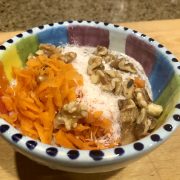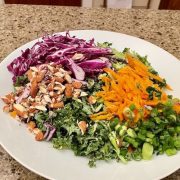Macronutrients for Health’s Sake!
Macronutrients are the nutrients we need in big (“macro”) quantities: carbs, fats, and protein. Each of these play a number of vital roles in constructing and fueling our bodies.
For optimal health, we need balanced diet of high-quality carbs, fats and protein. Intake will vary based on various factors such as activity level, stress levels, ancestry, genetics, digestive health, age, etc. The basic range needed to fuel function, support metabolic flexibility and ensure satiety is:
- Carbohydrate 30 – 40%
- Fat 30 – 40%
- Protein 20 – 50%
Carbs: Are found predominantly in vegetables, fruits, tubers, legumes, grains and sweeteners. Aim for getting most of your carbs from brightly colored vegetables. Carbs are a:
- Quick source of fuel for the brain and muscles
- In the form of fiber, they provide fuel for our microbiome and ensure regular elimination of waste
- Combined with fat and protein, carbs help us fight infections, grow new body tissue (bones and skin) and lubricate our joints
Fats: Are vital building block and source of energy in the body. Fats:
- Absorb fat-soluble vitamins A, D, E and K
- Regulate the speed we digest food, build cell membranes and certain hormones
- Maintain optimal cognitive function
- Protective lining for the organs
- Important source of high-caloric energy ideal for long, low-intensity activity
- Improves taste and increase satiety
Proteins: Have many vital roles myriad of roles in the body. Proteins provide building blocks for:
- Tissues such as organs, nerves, muscles
- Enzymes: specialized protein molecules that are the managers and catalysts for all biochemical processes
- Antibodies: protein structures that help fight infection and destroy foreign invaders
- Hemoglobin: special protein in red blood cells that transports oxygen around the body
- Insulin and glucagon: hormones released to help regulate blood sugar and energy levels
There are some healthy plant proteins, but high-quality, humanely raised protein from animal sources is much more bioavailable and includes all 9 essential amino acids necessary for health.
What To Do?
- Eat real food
- Track your macronutrients to determine current rations: Use an app such as MyFitnessPal or Cronometer.
- Keep a Food and Mood Journal and jot down what you eat and how you feel 1 – 3 hours are each meal
- Use the following criteria to help determine appropriate bio-individual rations.
| Right Macronutrient Ratio | Wrong Macronutrient Ration | |
| Appetite, Satisfaction, Craving | You feel full and satisfied
You don’t crave something sweet You don’t desire more food You don’t get hungry soon after eating You don’t need to snack before next meal
|
You feel full, but are still hungry
You desire something sweet Feel like something was missing Feel hungry soon after eating Need to snack |
| Energy Level | Energy is restored after eating | Feel hungry soon after eating |
| Have long lasting sense of wellbeing after your last meal | Low energy, fatigue, exhaustion
Drowsiness Hyper, jittery, anxious after your meal Feel hyper but exhausted underneath |
|
| Mental/emotional wellbeing | Feel re-fueled or restored
Uplift in emotions Improved clarity of mind Normalization of thought processes
|
Mentally slow, sluggish, spacey
Unable to think clearly and quickly Unable to focus Depression or sadness Hyper-anxious, obsessive behavior Anger or irritability
|
Food Sourcing:
- Think variety: eat a diverse range of plants and animals. Aim for 5 different colors on your plate each meal
- Think locally: this supports local farmers, reduces emissions and reduces the risk of contamination
- Think seasonally: foods that are in season where you live to get a wider diversity of nutrients and help prevent food sensitivities
- Think quality: If economically and geographically feasible, aim for the highest quality plant and animal foods possible. Animal foods best sourced from 100% grass-fed, grass-finished animals or pasture raised poultry. Seafood sustainable, wild-caught is best. For guidance on produce, use EWG Dirty Dozen , EWG Clean 15
For More Empowerment












Leave a Reply
Want to join the discussion?Feel free to contribute!